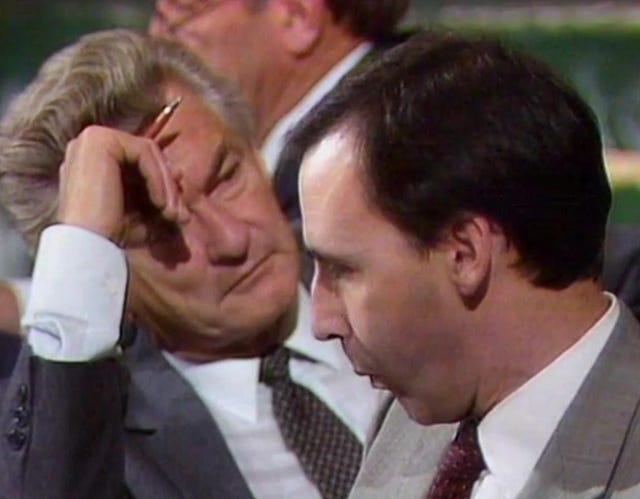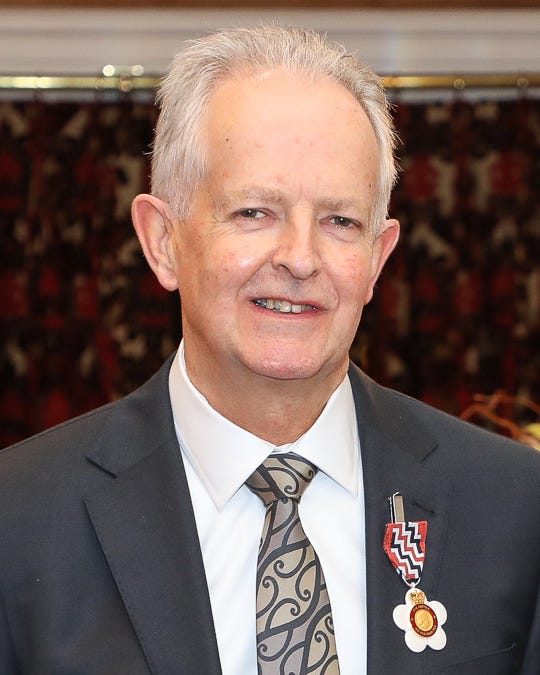Random acts of demagoguery
And 7 other things that will utterly transform your life!!
Random acts of demagoguery
I once attended an orientation session for a weekly seminar run by the philosopher Paul Thom at ANU. It was to be a two hour seminar and he proposed that each session would begin with a student presenting some kind of reflection. One of the students asked “Does my reflection have to go for the full two hours?”. Paul, paused, looked out the window and smiled, leaning into his very particular slightly camp manner and responded. “Well, I didn’t have in mind anything quite so … Wagnerian. We don’t want to encourage any acts of demagoguery.”
Well above is a hefty podcast interview. Castro once gave a speech which lasted over seven hours, so I’m working up to it slowly. This goes for 2 and three quarter hours and stretches over many topics. The interviewer - Ryan Faulkner-Hogg - is an enterprising and curious fellow who started a podcast some years ago called Curious Worldview. And his aim is to introduce the world to people he finds interesting and worth listening to. He’s been running his podcast for some time now and researches his subjects carefully. I found the process engaging and recommend his other interviews. If you’d like to check out his podcast, you can start here. I’ve also posted the audio on my podcast channel here.
Tariffs: it’s worse than you thought
I’ve had a somewhat different concern about Trump’s tariffs than most other economists. As economists jumped out of the blocks to say how self-defeating the tariffs were, how they’d contribute to inflation and make Americans worse off, I knew this wasn’t what the economic models say. I knew about the ‘optimal tariff’ argument first articulated in the mid 19th century. And, with my friend colleague and all round good guy Gene Tunny we wrote up the argument thus:
When economists tell you Donald Trump is *all* wrong about foreigners paying for his tariffs, don’t believe them. When large countries trade, they move prices.
In fact Americans will pay most of the tariffs, but not all of them. As America trades less, it makes a smaller demand on the markets supplying its imports (driving import prices down a bit) and has the converse effect on the markets into which it exports. And if you do the sums, the optimal tariff for the US is quite possibly 30 odd percent. That’s assuming other countries don’t retaliate.
But it’s actually much worse than that. First, not only don’t most countries retaliate because they’re terrified of the bully. I think I underestimated how few would. And it’s worse than that again. Because not only aren’t most countries retaliating. As Donald Trump brags, they’re kissing his arse. “Have some of our rare earths!”, “Can we buy more of your energy exports?”. So the US is big enough and ugly enough and most of its trading partners are craven enough that the US can do a lot better than the optimal tariff argument would have it if they have a sufficiently nasty resident megalomaniac (Ex Australian finance minister Peter Walsh’s expression for the Prime Minister).
Of course all this pales into insignificance against the other fact, that like the Piranha Brothers, Donald Trump is completely lawless. That will impose huge costs on the world. In fact they’ll be so high that they’ll overwhelm the terms of trade and other trading gains that are otherwise materialising.
Anyway, here’s Barry Eichengreen making these points.
Like British Prime Minister Margaret Thatcher in 1982, US President Donald Trump is betting that the surest way to win a war is to bring overwhelming force to bear. With one trade partner after another meekly accepting Trump's huge new tariffs, could he be right?
BERKELEY – US President Donald Trump's trade war resembles nothing so much as UK Prime Minister Margaret Thatcher's Falklands War in 1982: one side deploys massive force, and the other withdraws with its tail between its legs.
Of 57 countries and territories included in Trump's "Liberation Day" list of targets for "reciprocal" tariffs, just three – Brazil, Canada, and China – are credibly threatening retaliation against the United States. The Heard and McDonald Islands, populated only by penguins, were understandably supine. But it is more than a little surprising that so many others have taken US aggression lying down, given expectations of tit-for-tat retaliation...
The European Commission's agreement with the US is especially stunning in this respect. The Commission has accepted Trump's 15% baseline tariff, with exemptions only for aircraft parts, critical minerals, and a couple of other items. US duties on steel, copper, and aluminum remain at 50%. European Commission President Ursula von der Leyen has pledged that Europe will buy additional US energy and invest $600 billion in the US, although it is questionable whether such commitments are in fact within the Commission's remit. The Trump administration claims further that Europe will import more agricultural goods and loosen its restrictions on digital trade. In return, the EU receives basically nothing, only a US promise not to impose still higher tariffs, at least for now...
The outcome is widely seen as a sign of the EU's weakness, and there is more than a little merit to this view. The Commission had to negotiate an agreement on behalf of 27 countries with different positions on how aggressively Europe should respond. In France, there was considerable support for the idea that it was important to face down a bully. In Germany, by contrast, policy was shaped by automotive and machinery industries desperate to retain access to the US market on terms at least not grossly inferior to those obtained by Japan, South Korea, and the United Kingdom. These differences left the Commission with little wiggle room.
Then there is the fact that the EU continues to rely on the US for weaponry, and that it needs America's help in supporting Ukraine. Europe recognizes this vulnerability and is seeking to build up its defense and geopolitical capacities independent of the US. But substantial progress in this direction will take years...
Europe likewise lacks a pressure point analogous to China's control of rare earth refining, which allows the Chinese government to threaten targeted retaliation by cutting off an essential input required by US high-tech industries and by the country's defense complex.
Finally, like other economies contemplating how to respond, Europe faces a "madman" problem. Normally, the strongest argument for retaliating is to deter further aggression. A rational leader will understand that launching a trade war, much like launching a conventional war, will provoke a counterattack in which his country suffers as much as his opponent's. But this strategy works only when leaders are rational...
There is, however, a contrary view that Europe has shown strength, not weakness, in its response to Trump's trade war. Meeting tariffs with tariffs, especially when these have no deterrent effect, is simply a way of shooting oneself in the economic foot. Higher import prices fuel inflation and hurt consumers, and taxing imported inputs, as the US is doing, makes domestic production more costly and less efficient...
Something else that Trump's trade war and Thatcher's Falklands War have in common is their utility in distracting attention from their instigators' domestic problems – in Thatcher's case an unemployment crisis, and in Trump's the questions about the extent of his ties to the convicted pedophile Jeffrey Epstein, who hanged himself while awaiting trial on federal sex-trafficking charges. Helped by her victory in the South Atlantic, Thatcher would reign for eight more years. The US Constitution prevents Trump from serving as president until 2033. Or so we are led to believe.
Price discrimination: the joke
The Nixon Constitution as America’s Glorious Revolution: now undone
This post documents the truly shocking contrast between the health of the Great Republic’s response to presidential lawlessness under Nixon compared with its craven response today. Of course Trump is anathema to the republican vision of the founding fathers. But they were worried about the excesses of democracy bubbling up in the 13 states post revolutionary constitutions. They wanted a more mixed constitution. I don’t want to sound too anachronistic here. Britain was ‘state of the art’ governance at least as far as the educated and well-heeled folks were concerned with ‘the people’ represented by the House of Commons, the aristocracy represented by the House of Lords all brought together under a strong(ish) monarch. That’s roughly what they were aiming for by adding the Senate to the House of Representatives. And they wanted a strong and singular executive. And here we are.
For a long time, I've tried to make August 9 into an American holiday: Resignation Day... it wasn't until noon Eastern time on August 9 that he surrendered the powers of the presidency.
I had a dream that we would commemorate this great political victory and remind ourselves that vigilance can work.
There have been two factors working against my campaign... August 9 already has an infamous anniversary attached: the U.S. atomic bombing of Nagasaki.
Now, there's a third reason....
Why should Resignation Day be a civic holiday?
Because it was the U.S. version of the Glorious Revolution—the deposition of an abusive ruler to affirm a political order...
Nixon's crimes... solicited campaign contributions—really, bribes—with the implicit promise of presidential favors... and used official resources to reward friends and allies...
The immensity and length of the "Watergate" revelations led to the consolidation of what I... think of as the creation of the Nixon Constitution:
Independent media expectations – The press would act as watchdog over the presidency, not as government cheerleader
United States vs Nixon – Courts could force presidents to hand over documents and recordings, limiting executive privilege
War Powers Resolution – Congress must approve military action after 60 days, restraining presidential war-making
Federal Election Campaign Act Amendments – Strict limits on campaign contributions and spending to prevent corruption
Presidential Records Act – All presidential documents belong to the public, ensuring government transparency
Government in the Sunshine Act – Federal agencies must hold open meetings and publish their proceedings
Freedom of Information Act amendments – Citizens gained real power to access government records and data
Intelligence Community reforms – New oversight to prevent CIA and FBI from spying on Americans
Democratic accountability – The principle that public pressure could force even presidents from office
And each of them has now been shredded.
That brings us to our third reason to refrain from celebrating Resignation Day.
Nixon won.
The presidency as Donald Trump wields it is far more unconstrained than that Nixon occupied... many infamous abuses of the Nixon administration might not even qualify...
The presidency is now vastly closer to being an elected dictatorship than at any peacetime point in U.S. history...
It's hard, then, to celebrate Resignation Day. But that doesn't mean we should forget it. Rather, we should observe it, as penance and as prayer. (The penance can involve actually eating the cottage cheese as ritual purification.) If America is united by a civic religion, we need a day of remembrance.
Capitalism at its best
Rationalist cults: nothing good about them
I’m quite interested in rationalism as a species of irrationality. But I don’t want to read about it in detail - I can imagine the details. I wanted to get to the gories. So I got Claude to summarise it to check it out, and when I found the summary compelling, I asked it to edit it down according to its summary, which it did. I think it’s an interesting reduction of the article, but you may want to read the whole thing.
The rationalist community was drawn together by AI researcher Eliezer Yudkowsky's blog post series The Sequences, a set of essays about how to think more rationally. You would think, then, that they'd be paragons of critical thinking and skepticism — or at least that they wouldn't wind up summoning demons.
And yet, the rationalist community has hosted perhaps half a dozen small groups with very strange beliefs... the most famous, a loose group of vegan anarchist transhumanists nicknamed the Zizians, have been linked to six violent deaths. Other groups include Black Lotus, a Burning Man camp led by alleged rapist Brent Dill, which developed a metaphysical system based on the tabletop roleplaying game Mage the Ascension. Another is Leverage Research, an independent research organization that became sucked into the occult...
The problem of young rationalists
The Sequences make certain implicit promises. There is an art of thinking better, and we've figured it out. If you learn it, you can solve all your problems, become brilliant and hardworking and successful and happy, and be one of the small elite shaping not only society but the entire future of humanity.
This is, not to put too fine a point on it, not true.
Multiple interviewees remarked that the Sequences create the raw material for a cult... But people who are drawn to the rationalist community by the Sequences often want to be in a cult... they want some trustworthy authority to change the way they think until they become perfect, and then to assign them to their role in the grand plan to save humanity...
The promise of the Sequences is more appealing to people who have very serious life problems they need desperately to solve... [particularly] transgender people who are often cut off by their families... The dysfunctional group can feel like a safe haven...
Beware psychology
The most interesting question I asked my interviewees was "what was your day-to-day life in the group like?"
Dysfunctional groups: "We spent all our time talking about philosophy and psychology and human social dynamics, often within the group." "Really tense ten-hour conversations about whether, when you ate the last chip, that was a signal that you were intending to let down your comrades..."
Conversely, functional groups: "I learned to drive... I got my first programming job. We played calibration games..."
Rationalist groups tend to be functional to the extent that their activities involve learning to program, writing papers for general publication, building a giant dome on the playa, or otherwise interacting with the real world. Rationalist groups tend to be dysfunctional to the extent that their activities involve very long conversations about human psychology and social dynamics, especially dynamics within the group itself...
There is no conflict so small that five hours straight of emotional processing can't make it feel both profoundly important and profoundly unsolvable... And without the steadying influence of some kind of external goal you either achieve or don't achieve, your beliefs can get arbitrarily disconnected from reality...
Consequentialism
Brent Dill convinced some people that he was an extraordinary genius who would be capable of fantastic achievements, just as soon as he stopped being depressed. Therefore, from a consequentialist perspective, you should focus your effort on fixing his depression, no matter how much time or money or emotional energy it takes (and if you could throw your vagina into the bargain that would help too)...
"The issue is that 'something, something dead babies' justifies an awful lot," said one interviewee. Many rationalists believe that an artificial general intelligence (AGI) will be developed very soon... Many of them also expect that, without heroic effort, AGI development will lead to human extinction.
These beliefs can make it difficult to care about much of anything else: what good is it to be a nurse or a notary or a novelist, if humanity is about to go extinct?..., if humanity is about to go extinct?...
Beware isolation
A recurring theme in my interviews was social isolation and groupthink: speaking primarily or only to people inside the group; rejecting dissidents or outsiders as unenlightened, as ignorant, as evil...
If one of his followers objected to his behavior, Brent Dill would ask a few of his other followers to talk to them about it... that was the one Brent sent to talk to the dissident.
Other times, the dynamic occurred more-or-less by accident. Researchers at Leverage all lived together... this pattern meant that many researchers got everything from Leverage: sense of purpose and meaning, work, therapy, friendship, romance, food, housing, and routine life maintenance. Connections to the outside world often faded...
Fascinating article
Good impersonation
The unaccountability machine rolls on
Thanks to a reader for drawing this to my attention. I was dimly aware of it. It may be unusually egregious, but the failure of accountability is utterly standard and most of us know lots of situations where accountability has gone missing because it’s simply not worth the angst of those senior folks who’d need to take it up to do so. Better, having detected some misbehaviour to just move the misbehaviour on - the standard operating procedure in the Catholic Church for all those years.
Lawmakers, economists, public sector workers, academics — every profession attempting to understand and shape modern society relies on good data. For a long time, the UK's Office for National Statistics (ONS) was seen as a global leader, seemingly beyond reproach. But the mask has slipped.
Those working on our official statistics, including at the UK Statistics Authority (UKSA), which oversees the ONS, have been forced to acknowledge significant problems... the committee of MPs I chair took a closer look. I'm afraid what we've discovered was nothing short of staggering.
Let's be clear: the leadership of our country's vital statistical data function has overseen a catastrophic decline in standards. A weak board... has failed to confront systemic failures and lost the confidence of the government, parliament and most of its staff.
Take one example that came up in a recent session. An internal ONS report found deep-seated problems including poor communication between the leadership and junior staff. How did the chair of the UKSA learn of this work? By chance, during a random water-cooler chat a year later. It would be comical if it weren't so depressing.
So where does the buck stop? When the committee asked the current [interim] national statistician, Emma Rourke, if anybody had been held accountable, we were simply told "no"... The committee will, therefore, seek evidence from those who took crucial decisions before leaving their role — including former head of the ONS, Sir Ian Diamond.
Thankfully, the past few years have seen a series of very important and serious reviews... If the house is on fire, why do the bosses need to wait for five people to tell them the building's about to collapse before they phone the fire brigade?
As is so often the case, the rot can be traced back to the organisation's apparent disregard for basic rules... Square pegs met round holes, with the inevitable consequence of senior staff jumping ship...
We have diagnosed the illness, now it's time for the cure... Another request I have made is for interview panels to include respected statisticians. This will restore confidence and credibility to an organisation which is in short supply of both.
To its credit, the government is beginning to show it has grasped the scale of the problem and is finally taking action... Darren Tierney will be installed in a new role as ONS permanent secretary, effective immediately. Tierney must prioritise rebuilding the leadership culture, starting with shattering the glass ceiling of information that prevents junior staff from speaking truth to power.
Other structural reforms could also be considered... My committee will keep a keen eye on discussions.
If those who produce and deliver our official statistics are to restore their reputation, they must be open to change... My committee's inquiry will help ensure the next stage of this process is about action, not just talk. The government and UKSA must commit to the same.
Young archibald prize winners and short-listers

It had to happen
A Keating appreciation channel of TikTok
 Tiktok failed to load.
Tiktok failed to load.Enable 3rd party cookies or use another browser
Andrew Sullivan and a trans activist: Recommended
Andrew Sullivan is a conservative, gay activist who played an important role in dragging same sex marriage into the Overton Window. But he’s been very hostile to what he thinks (and I agree) are the excesses of trans activism. It’s a great conversation, though Sullivan’s early presumption that his experiences offered a worthy frame the discussion seemed heavy handed and arrogant to me. They both agree that gay and trans activists have done a lot of damage to their own cause in anathematising evangelical Christians. They both agree that same sex marriage was hugely valuable in healing families and showing evangelicals that LGBTQ folks are just like normies. Most want stable, loving relationships. Normally Sullivan gives non-subscribers like me 45 minutes and then tells you that “the conversation is just getting started” and that you’ll get the rest if you subscribe. Normally I’m not especially tempted - you can learn a lot in 45 minutes. But here they actually go for a little over an hour and the temperature suddenly rises on the question of teen gender reassignment and the numbers who subsequently want to detransition.
Brushing up the stones of eternity
The vanished chiaroscuro of Notre Dame
Henry Ergas is disquieted by the lightness of Notre Dame’s restored interior.
Although brilliantly sunny, it was definitely overcoat weather when I first visited the recently reopened Notre Dame. Basking in the winter light that poured in through its windows, the vast interior effortlessly swallowed up the hordes of tourists noisily jostling their way around its crypts and altars. Once again, the cathedral's timeless beauty triumphed, as it always had, over the petty inconveniences that are the price of fame.
On April 16, 2019 the building had been a half-destroyed hulk, still smouldering from the fire the previous night that turned its 13th-century wood scaffolding into a blazing inferno. That it had now been so magnificently restored seemed nothing short of miraculous.
...President Emmanuel Macron promised to rebuild Notre Dame within five years. The fact that his promise had been met, despite the task's enormous scale and complexity, only made the achievement all the more extraordinary.
Little wonder then that the sense of irrecoverable loss, when the images of the blaze first flashed across our screens, was so overwhelming. So was the public response, with contributions flooding into the hastily established reconstruction fund. It would, however, be a serious mistake to think that Notre Dame had always been dear to the Parisian heart. In effect, Hugo's decision, in 1830, to write his great novel was driven by sheer desperation. The building he considered "the ancient queen of our cathedrals" appeared doomed to fall into ruins...
The Gothic Vision of Light and Darkness
What is at the heart of that effect is not the edifice itself. The cross-ribbed vaults, pointed arches and flying buttresses are, for sure, stunning feats of engineering... But those engineering achievements were, the eminent German art critic Otto von Simson pointed out, "constructive means, not artistic ends". The end, which made the Gothic entirely different from its predecessors and successors, was to design a structure that soared towards the heavens and yet was sustained by exterior walls "pierced by continuous rows of windows". As a result, the building itself would ultimately appear as "a shallow transparent shell" around the nave, while the windows would "seem to merge, vertically and horizontally, into a continuous sphere of light, a luminous foil behind all tactile forms of the architectural system".
This was, in other words, a design entirely oriented to the exaltation of light... The emphasis on light was readily understandable in an age where lives were largely spent in darkness. Ordinary candles, even when densely stacked, were less luminous than today's dimmest light bulbs; in almost all towns and villages, the risk of fires meant that most forms of illumination were prohibited at night. To bask in the concentrated radiance that shone through the multicoloured windows of Gothic cathedrals would have been an experience that transcended mundane life.
...In the theological system recorded in the text known as Theologia Mystica, which was absolutely central to the conception of the cathedrals, God is presented as the initial, uncreated light, the origin of all creatures... It was therefore no coincidence that when the rebuilt Cathedral of Saint-Denis, which effectively launched the Gothic era, was consecrated, the verse the choir chanted from the breviary was "All thy walls are precious stones". Like "shining gems", said the cathedral's great architect, Abbot Suger, the "reciprocal coupling" of otherworldly and this-worldly light admitted through the sacred illustrations in the stained glass would instantiate the lux nova, or new light, that was Christ.
But that effect relied not just on the light but on the contrast between the windows' luminescence and the dense gloom of the cathedral's interior. It was not light alone, but the interplay of light and darkness – what Suger referred to as "bright-dark brilliance" – that conveyed the abject reality of sin on the one hand and the hope and promise of redemption on the other...
For centuries, that duality of light and darkness, sin and redemption, was inescapable in the Gothic cathedrals. The soot from their giant candles, which on feast days were 2.5 metres high and weighed up to 100 kilos, enveloped the interior in a shroud of darkness. The walls were rarely cleaned; and even when they were, black was merely reduced to a dark shade of grey. To see the light stream in from on high was to be reminded of what was meant by sheer beauty.
So it still was, more than 50 years ago, when I first visited those monumental structures. Yet that is no longer the case at Notre Dame. Newly washed and painted, its internal walls gleam, at times glistening; gloom, it seems, has been banished. And the light, even from the roses, is no longer an imminent force, perspiring through the stone, caressing the cathedral with its presence. Rather, it resembles the pure physicality, the irreducible "thingness", of contemporary light sculpture, in which, as the poet Wallace Stevens suggested, lasers project a focused beam of unbearable brightness that "adds nothing, except itself, to reality".
But a cathedral in which there is light without darkness is like a world that has turned its back not just on faith but on human fallenness and fallibility...
Heaviosity half-hour
An amazing judgement from New Zealand’s high court
Dear Claude,
I am writing to you to let you know what has been agreed between your mother and father today. This has been with the help of Ms Kenny, your lawyer. You know her as Leanne. Your parents' lawyers have also helped.
The good thing to say is that your mother and father have agreed about this. I think that is positive. I hope that reassures you.
This case is about you and your future. So, I am writing to you personally as a way of recording the decisions, rather than giving you a more formal legal decision. The lawyers have agreed this would be helpful. I hope it is clear.
You will remember that back last year in November a Family Court Judge made a temporary order that you and your younger sister would go to [an overseas city] where your father lived. He was already looking after your older brother.
The Judge thought that would be in your best interests. You could live with both your brother and your sister. And you would be connected to your father's culture and language. That Judge made a very careful and thoughtful decision.
Another reason the Judge made that decision is that at the time (you will remember) he understood that you agreed to going to [the overseas city]. I think that was what you wanted then.
After that decision, you began to change your mind. I do not know the exact reasons, but you made that clear to Leanne, your lawyer. And in January, when it came to getting on the plane to [the overseas city], you would not do it. In fact, you would not even get into your mother's car to go to the airport. It seems that for a little while you ran away from home.
A few weeks later, another Family Court Judge decided that the temporary order for you to live in [the overseas city] should stand. She issued a warrant—a court order—to put you on the plane, by force if necessary.
When the Judge met you and explained her decision to you, as I understand it, you got very upset. You hit the wall of the room you were in. You needed to be calmed down. The Judge had to leave very quickly.
The decision was appealed the very next day, 21 February 2025. Your mother's lawyer wanted to argue that your voice had not been properly taken into account. I am sorry the appeal has taken so long to get before this Court.
When children are involved, these delays are wrong and unacceptable. I want you to know that.
Before the appeal today, I heard that you wanted to talk to me. This does not happen often in the High Court. But you are 14-and-a-half years old. Your views are important. That is what the law says. All the lawyers agreed that interviewing you would be the right thing to do. So did your mum and your dad. So, I talked to you for about 45 minutes in the Court with the Court Registrar present and with Leanne, your lawyer, here as well.
I enjoyed doing that. It was good to meet you.
All I need to do in this letter is to summarise what you said.
The main thing is, you made clear that you do not want to leave Auckland. You do not want to go to [the overseas city]. You want to stay here so that you can go to school to be with your friends and play rugby. You said that you will not get onto the plane. No one could make you do that, and you were not going to go. You were very clear about that. You said that to me several times. I understood it.
You said you would go to [the overseas city] but only for holidays and knowing that you would come back.
You said that things are better this term at [your school]. You know that there are still improvements to make in your behaviour, but things are going better than in the last two terms. You are taking two tablets for your ADHD every morning, and your brain feels calmer. You like PE. You do not like maths. (And, as I said, neither did I at your age.)
You also said that you do not like your parents—particularly your father—saying bad things about the other parent. You told me some of the things that your father had said. You said the last one happened about a week ago, but it has stopped since then because your lawyer wrote about your concerns in her report. You said you will only go on holiday to [the overseas city] if your father stops talking badly about your mum and saying bad things about her.
You said a lot more than that but that is the summary.
Before the hearing started, I passed your views onto the lawyers and your parents. They listened carefully. I also said that I had made clear to you that you do not have the job or the burden or the responsibility to decide this case. I said you were caught up in the middle. It is not your problem.
The good thing to tell you Claude is that your mother and father and the lawyers thought it would be good for them to talk about how the appeal could be sorted. They wanted to talk together and agree as much as they could.
I want to tell you now what was agreed.
First, and this is what you will most want to know, you will be staying in Auckland with your mother and going to school here until the Family Court case about your care is finally decided.
You know that what is being decided now is just a temporary decision until the Court can finally decide your case later this year. The Court thought back in November last year that decision could be made in November this year, but no date has been set.
The second thing that was decided was that you would go to [the overseas city] for the school holidays. This year there are different dates for the New Zealand school holidays and the [overseas country] holidays. I think it is very important you have the best time to see your brother and your younger sister. That time will be when they are not at school. Also, it is important that you are able to see and have a good time with your father who is a [redacted]. He wants to spend time with you. He wants to do things with you. He knows you like things like swimming, and he wants to try to improve his relationship with you. He knows that you do not want him to say bad things about your mother. And he has said he will not.
I need to tell you two other things about that. First, your mother has said she will pay for your airfare. That shows that she thinks it is right for you to go to [the overseas city] during the holidays. You will know that three times previously your father has paid for airfares, but you have not got on the plane. And he has not been able to get those airfares back.
The second thing to say is that I know this is not an ideal time for you to go and perhaps you would rather go during the New Zealand school holidays. And this may affect you playing in the summer Tag competition which, I understand, starts at the end of August. So, I know you may be disappointed about this. But it will mean that you will be able spend good time with your family in [the overseas city]. And I think it is important that you do so. I hope you understand why the decision has been made. This is a one-off. It will affect your schooling if you were to miss two weeks of the school term again. But in Year 10, it can be managed and your Dean, [redacted], has agreed that it can be done.
You will be excited to know (not) that some schoolwork can be prepared that you can take with you. It will be good if you can do a little bit of that work in [the overseas city] and your father has said he will try to help you with it.
I want you to know what we had decided in my words.
Both your mum and dad have promised me that they will make this work. And they have promised to the Court that they will not say bad things about each other in your presence or in the presence of any of the rest of the family. And I should say I have told your dad, and I am telling him now, that if your dad can do his best to stop your sister from saying bad things about your mother as well, that you would like that.
I do not know when the final Court decision will be, but we are all very hopeful it will be at the end of this year. I will do all I can with the Auckland Family Court to have your case treated urgently.
One of the things that has been agreed is that you will contact your father on video calls on Wednesdays and Sundays at 7.00 pm New Zealand time. This will be in private and uninterrupted. Just you and your dad. But you can talk to him at any other time or text him if you want.
Now that this appeal has been sorted, and as your father has promised not to say bad things about your mother, I hope you may be able to talk to him more often. How often, is up to you. When that starts, is up to you. But I do know that your father does want to talk to you and does love you.
Leanne will explain all this to you again. But you need to know I have listened carefully to your views and have factored them into this decision. And another Judge will want to hear from you when the final decision is made.
I think Leanne will be able to explain everything to you. However, if you wanted to write to me, or if you wanted Leanne to write to me, that would be fine.
Can I say Claude it was very nice to meet you. I enjoyed meeting you. Like you, I hope the Warriors do a lot better in the next couple of weeks. And I agree that try by Leka Halasima was 10/10. As I said to you, I thought it was 11/10.
Sport is important. You keep up your involvement in sport. That will give you a good basis to do well in life. I am glad you enjoy it. Maybe one day I will sit in my lounge and watch Claude [surname redacted] play for the Warriors. That would make me and all of us very, very happy and proud of you.
I wish you well for the future.
Warm regards
Justice Andrew Becroft High Court, Auckland
This is an oral judgment from the High Court of New Zealand, Auckland Registry (CIV-2025-404-950, [2025] NZHC 2148) delivered on July 31, 2025, by Justice Becroft.





















Thanks yet again Nicholas for a wide ranging and thought provoking collection of things.